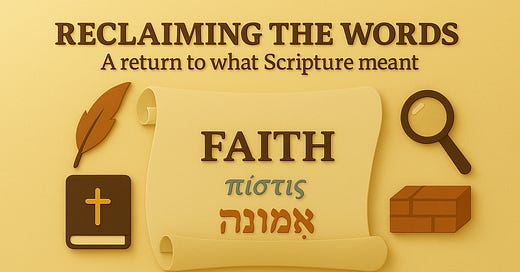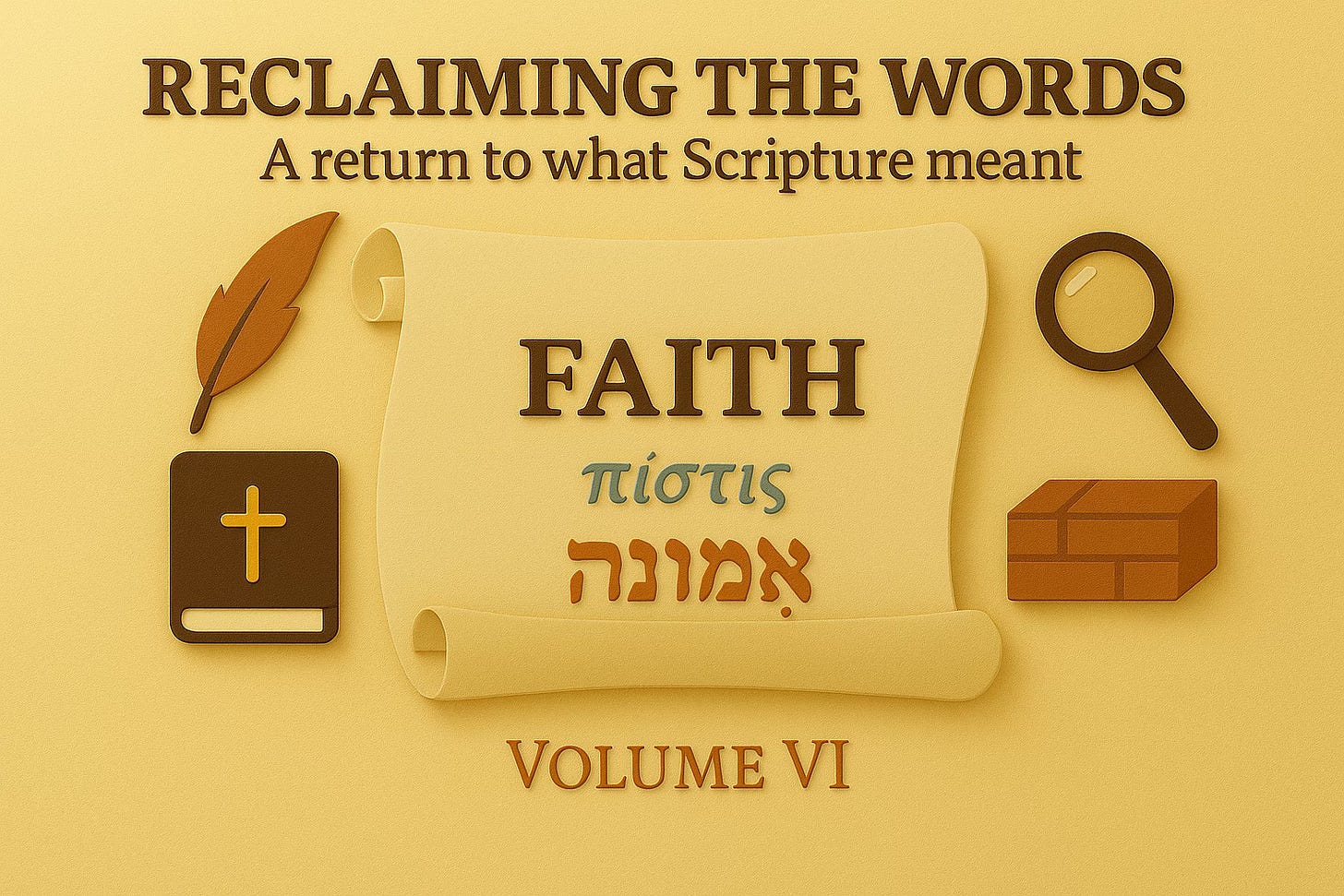Reclaiming the Words, Vol VII: Faith
What if “faith” isn’t just belief in your heart — but loyalty lived out with your life?
Reclaiming the Words, Vol VII: Faith
What if “faith” isn’t just belief in your heart — but loyalty lived out with your life?
About the Series: Reclaiming the Words
Language forms faith — and over time, sacred words lose their shape.
Reclaiming the Words is a weekly series dedicated to recovering the original meaning of key biblical terms. By exploring the Hebrew and Greek roots of words like believe, grace, law, repent, holy, and now faith, we rediscover their covenant context, cultural grounding, and Kingdom purpose.
Each word reclaimed becomes a doorway to deeper discipleship, rooted in the life and teachings of Yeshua.
Part VII: What Is Faith, Really?
Reclaiming Emunah and Pistis as Covenant Trust and Loyal Obedience
“The righteous shall live by faith.”
— Habakkuk 2:4; Romans 1:17
In modern usage, “faith” is often reduced to mental agreement — believing that God exists, or that certain doctrines are true. But in Scripture, faith is not passive. It is relational, active, and loyal.
Biblical faith is about who you trust, how you live, and where your allegiance lies.
The Hebrew Word: Emunah (אֱמוּנָה)
The Hebrew word emunah comes from the root aman (אָמַן), meaning:
To support
To confirm
To be faithful or trustworthy
Emunah is often better translated as:
Steadfast trust
Faithfulness
Reliability or integrity in relationship
“Moses’ hands were steady [emunah] until the going down of the sun.”
— Exodus 17:12“Yahweh is a God of faithfulness [emunah] and without iniquity, just and upright is He.”
— Deuteronomy 32:4
In Hebrew thought, to have faith is not to say something — it is to live in covenant fidelity over time. It is relational commitment that shows up in action.
The Greek Word: Pistis (πίστις)
In the New Testament, the word pistis is usually translated “faith,” but it includes a fuller range of meaning:
Trust
Faithfulness
Loyalty or fidelity
In the Greco-Roman world, pistis was a term for allegiance in relationships and covenants. Paul uses it to describe the believer’s response to Yeshua not merely as mental assent but as whole-life allegiance to the Messiah-King.
“What is required of a servant is that he be found faithful [pistos].”
— 1 Corinthians 4:2“I have fought the good fight, I have finished the race, I have kept the faith [pistis].”
— 2 Timothy 4:7
Faith in the Life and Teachings of Yeshua
Yeshua never treated faith as something abstract. He recognized it in the actions of those who trusted Him:
He praised the emunah of the centurion who believed in His authority (Luke 7:9)
He healed the woman who touched His tzitzit, saying “Your faith has made you well” (Mark 5:34)
He asked, “When the Son of Man returns, will He find faith [pistis] on the earth?” — Luke 18:8
For Yeshua, faith was never static. It was movement toward the Father — trust that showed itself in loyal obedience and deep dependence.
Why the English Falls Short
The English word “faith” often implies a belief system — a set of ideas you agree with in your mind. But in Scripture, emunah and pistis are relational commitments — a way of living that reflects trust in Yahweh and fidelity to His covenant.
Faith is not just what you believe.
Faith is how you live because of who you trust.
Practical Application:
Let Faith Become a Way You Live — Not Just Something You Believe
Faith isn’t a moment. It’s not a private conviction or a Sunday posture. True emunah — true pistis — is a way of being in covenant with Yah.
To live by faith means you:
Trust Yah’s character, even when outcomes are unclear
Remain loyal to His word, even when it costs you
Endure with hope, not because you see the future, but because you know the One who holds it
Anchor your identity not in your feelings or failures, but in His faithfulness
This kind of faith doesn’t flicker with circumstances — it abides. It’s steady. Quiet. Resilient. Relational. It’s how you show up in the world as someone whose allegiance belongs to a different Kingdom.
“The righteous shall live by faith.”
— Habakkuk 2:4
Faith is not what you visit.
Faith is where you dwell.
Five Discussion Questions
How does understanding faith as emunah and pistis reshape your view of discipleship?
In what ways has faith been reduced to belief in modern culture — and why is that a problem?
How does Yeshua model faithful trust and loyalty in His own life?
Can someone “believe” in Yeshua but still lack biblical faith?
Where in your life are you being called to faithfulness, not just belief?




